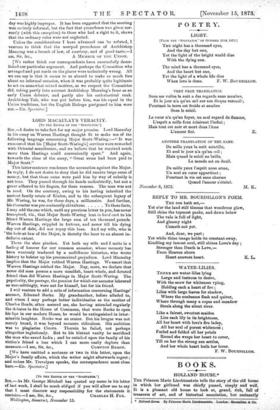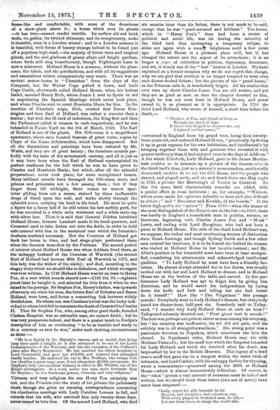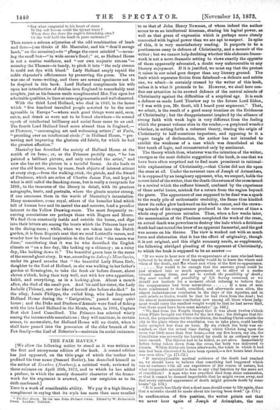BOOKS.
HOLLAND HOUSE.* THE Princess Marie Liechtenstein tells the story of the old house in which her girlhood was chiefly passed, simply and well. It is a pleasant old house to look at, grand, rich, full of treasures of art, and of historical association, but eminently
•
Holland.Boum. By Princess Maria Liechtenstein. London: Macmillan is CD. tome-like and comfortable, with none of the dreariness of a show-place about it ; a, house which even its ghosts --it has two—cannot render terrible. Its mellow old red brick walls, its gables, its twisted chimneys, and its evergreenery, make
it cheerful, even in 'a London winter; and in a London summer it
is beautiful, with forms of beauty strange indeed to be found just off a populous high-road,--the majesty of forest trees and tropical plants, and the cool gladness of grassy alleys and bright gardens,
where birds still sing tumultuously, though Nightingale Lane is now a misnomer. Holland House is a museum, without the glass- cases, the labels, and the petrifactions, and with all its suggestions and associations within comparatively easy reach. There was an ancient manor-house in " Chesinton" from the days of the 'Conquest, but Sir Walter Cope pulled it down, and built
Cope Castle, afterwards called Holland House, when his heiress Isabel, married Henry Rich, whom James I. sent to Spain to aid in negotiating the Spanish Marriage whieh never took place, and whom Charles sent to court Henrietta Maria for him. In the troubles of Charles's reign, Rich, created first Baron Ken- sington and then Earl of Holland, was rather a waverer than a -traitor ; but with the ill-luck of indecision, the King first and then the Parliament called it treason to each respectively, and he was beheaded in Palace Yard on the 9th of March, 1648. The Earl of Holland is one of the ghosts. His Gilt-room is a magnificent apartment, which once boasted frescoes of great value, copies by Cleyn of the Nozze Aldobrandini, which have disappeared. But all the decorations and paintings have been restored by Mr. Watts, and they are of great beauty ; the furniture accords per- -fatly with the taste of the seventeenth century, and all is just as it may have been when the Earl of Holland contemplated its perfect readiness for the ball which he was to have given to 'Charles and Henrietta Maria ; but which, after all the splendid preparations, never took place, for some unexplained reason. Many brilliant crowds- have thronged the Gilt-room since, and princes and princesses not a few among them ; but if they linger there till midnight, there comes an unseen spec- tator gliding from out a recess, stained by three ineffaceable -drops of blood upon the wall, and walks slowly through the splendid scene, carrying his head in his hand. He must be quite a figure for a fancy ball if he still retain his last earthly garb, for he was executed in a white satin waistcoat and a white satin cap with silver lace. Then it is said that General Fairfax inhabited Holland House, General Lambert made it his head-quarters, and Cromwell used to take Ireton out into the fields, in order to hold safe counsel with him in the sustained roar which the Ironaide's deafness rendered necessary. But the Countess of Holland got back her house in time, and had stage-plays performed there when the theatres were shut by the Puritans. The second period of interest about Holland Haase was when Addison lived there, as the unhappy husband of the Countess of Warwick (the second Earl of Holland had become fifth Earl' of Warwick in 1673, and this lady was the widow of the sixth) ; and died, according to the stagey storywhich we should like to disbelieve, and which we regret vvairever written. In 1749 Holland House was let on lease to Henry Fox, at .a rent which sounds absurd now—£182 16s. 9d.—eighteen .years-later he bought it, and selected his title from it when he was raised to the peerage. SirStephen Fox, Henry's father, waa np wards ofseventy-six when his: sons, the future Earl of Ilchester and Baron Holland, were born, and forma a connecting link between widely divided-eras. He whose son was Chatham's rival was the lucky indi- vidual to whose lotitfell to announce thed eath of Cromwell to Charles II. That Sir Stephen Fox, who, among other good deeds, founded -Chelsea.Hospital, was an estimable man, we cannot doubt ; but he was very prosperous indeed, and there is a quaint touch in Evelyn's description of him as continuing " to be as humble and ready to do a courtesy as ever he was," under such thriving circumstances as these :— " He is so highly in his Majesty's esteem, and so useful, that being long since made a knight, he is also advanced to be one of the Lords 'Commissioners of the Treasury, and has the reversion of the Cofferer's place after Harry Brouncher. He has married his eldest daughter to Lord Cornwallis, and gave her £12,000, and restored that entangled family besides. He matched his son to Mrs. Trollope, who brings with her (besides a great sum) near, if not altogether £2,000 perannum. Sir Stephen's lady (an excellent woman) is sister to Mr. Whittle, one of the King's chirargeons. In a word, never was man more fortunate than Sir Stephen ; he is a handsome person, virtuous, and very religions."
Virtuous and very religious his son Harry Fox certainly was not, and the Princess cuts the story of his private life judiciously -short, though she gives an amusing correspondence concerning lia.elandestine marriage with Lady Caroline Lennox in full, and seCordis that his wife, who survived him only twenty-three days, covet-ceased to loire him. Of the second Lord Holland, who died
six months later than his father, there is not much to be said, except that he was "good-natured and brilliant." The house, which in " Harry Fox's " time had been a centre of
political and social life, was let during the minority of the third lord, thus undergoing a temporary eclipse, to shine out again with a stead' brightness until a few years ago. Holland House is a pleasant place still, but it has changed the nature and the aspect of its attractions ; it is no longer a foyer of celebrities in politics, diploniacy, literature, and art, it is only one of the " best " houses in London. We have explained on a former occasion why we do not regret this change, why we are glad that intellect is no longer tempted to wear even such flower-decked fetters ; but the picture of the " proof-house," as the Princess calls it, is wonderfully bright. All the stories that ever turn up about Charles James Fox are old stories, and yet they are as good as new, so that the chapter devoted to him, though he was not even born in Holland House, and never owned it, is as pleasant as it is appropriate. In 1796 the third Lord Holland, who wrote of himself, a short time before his death,—
" 'Nephew of Fox, and friend of Grey,— Enough my mood of fame If those who deign'd to observe me, say I injured neither name,' "
—returned to England from his grand tour, being then twenty- three years old, and restored Holland House, "practically, by fitting it up at great expense for his own habitation, and intellectually by bringing together those wits and geniuses who invested it with greater brilliancy than it had enjoyed even in the days of Addison." A list which Elizabeth, Lady Holland, gave to Sir James Mackin- tosh enables us to summon up a picture of the famous salon in the third lord's time, just as a servant's memorandum, accidentally discovered, enables us to see the Gilt Room, and the people who danced, and played cards, and ate and drank there one May night in 1753, a picture like Browning's of Venice in Carnival. To this list some brief characteristic remarks are added, with a quaint effect in some instances ; as, for example, " Wishaw, whose sense made his opinions valuable to have and also difficult to obtain ;" and " Bannister and Kemble, of the boards." Is the latter high-polite for " actors "? From 1799—when the names Of the moat distinguished of the Emigres are on the list—to 1840, there was hardly in England a remarkable man in politica, science, or literature, beginning with Charles James Fox and " Monk " Lewis, and ending with Lord Houghton, who had not been a guest at Holland House. The wife of the third Lord Holland was, we suppose, the rudest and most overbearing woman of distinction since Sarah Jennings, and though Sydney Smith and a few other men resisted her insolence, it is to be feared she bullied the women who visited at Holland House to her heart's content ; and Mr. Allen's position in her household must have been at least undigni- fied, considering his attainments and acknowledged intellectual qualities. "To Lady Holland he must have been a friendly fac- totum. He almost always attended her in her drives, was usually invited out with her and Lord Holland to dinner, and in Holland House sat at the bottom of the table and carved. In this per- formance Lady Holland was apt to fidget him by giving him directions, and he would assert his independence by laying down the knife and fork and telling her she bad better do it herself 1 " How like " The Virginians " this passage sounds 1 Everybody went to Lady Holland's dinners, but everybody hated her dinner-boar, half-past six. Somebody said to Talley- rand, " I wonder why Lady Holland dines at such an hour?" Talleyrand solemnly drawled out, " Pour goner tout le monde!" The host was perhaps not quite so clever as some among his company, but "his mimicry was inoffensive, his wit did not pain, and his subtlety was in all straightforwardness." His strong point was a passionate devotion to Napoleon, which sometimes ran into the absurd. In Napoleonic relics, Holland House may vie with Madame Tussaud's ; but the snuff-box which the Emperor intended for Lady Holland, and which she received after his death, was bequeathed by her to the British Museum. This legacy of a deed man's snuff-box gave rise to a tempest within the inner circle of intimates, and Lord Carlisle, with his unhappy facility for rhyming, wrote a remonstrance—preserved among the MSS. at Holland House—which is almost inconceivably ridiculous. Of course, in the " salon " system a vast amount of nonsense must be talked and written, but we should think these verses (two out of seven) have never been surpassed :- "Lady, reject the gift, beneath its lid
Discord, and slaughter, and relentless war, With every plague to wretched man, lie hid,— Let not these loose, to range the world afar. " Say what congenial to his heart of stone In thy soft bosom could the tyrant trace ? When does the dove the eagle's friendship own ? Or the wolf hold the lamb in pure embrace ?"
Then comes a solemn adjuration of the odd combination of lamb and dove—(one thinks of Mr. Mantalini, and his " dem'd savage lamb," on the occasion)—to " gunge the curet mischief "—mean- ing the snuff-box—" in wide ocean's flood ;" or, as Holland House is not a marine residence, and " our own majestic stream"— meaning the Thames—is handy, to pitch it into " the only stream he could not dye with blood." Lady Holland amply repaid the noble rhymster's officiousness by preserving the poem. The era was one of verse-writing, and there are several specimens not to be despised in this book. Lord Holland compliments his wife upon her introduction of dahlias into England in remarkably neat couplets, just as his famous uncle complimented Mrs. Fox upon her admirable qualities, in lines at once epigrammatic and well-deserved.
With the third Lord Holland, who died in 1840, in the house which " five hundred travelled people asserted to be the most agreeable in Europe "—where such good things were said, seen, eaten, and drunk as were not to be found elsewhere-its second epoch• of intellectual brilliancy and social fame came to an end. The fourth Lord Holland lived more abroad than in England,— at Florence, " encouraging art and welcoming artists ;" at Paris, " presiding over an intellectual circle ;" in Holland House, " pre- serving and improving the glorious old fabric, for which he had the greatest affection."
Macaulay has described the society of Holland House at the zenith of its fame ; or, as the Princess prettily says, " he has painted a brilliant picture, and only excluded the artist," and now she has set the picture in a tasteful frame. As she leads us over the old house, room by room, fresh objects of interest attract at every step,—from the walking-stick, the pistols, and the Sword of Prudence, which are relics of Charles James Fox, and kept in what is still called the Smoking-room, but is really a receptacle for MSS., to the treasures of the library in detail, with its .precious autographs, busts, and portraits, where the ghosts muster strong, if one summons them in the words of Macaulay's incantation. Many mementoes, some royal, others of the homelier kind which tell of human love and its sacred ties and sorrows, lend a peculiar interest to the Yellow Drawing-room. The most frequently re- curring associations are perhaps those with Rogers and Moore. We find them constantly inside and outside the house, and dips into their letters are among the treats which the Princess lays out in the dining-room ; while, when we are taken into the Dutch garden, it is from Rogers's seat that we read Luttrell's verses, and wonder how he found inspiration in the fact that " the season was June," considering that it was he who described the English climate as " on a fine day, like looking up a chimney ; on a rainy day, like looking down it." The beautiful green lane is the scene of the second ghost story. It was, according to Aubrey's Miscellanies, under its grand arcades that " the beautiful Lady Diana Rich, daughter to the Earl of Holland, as she was walking in her father's garden at Kensington, to take the fresh air before dinner, about eleven o'clock, being then very well, met with her own apparition, habit, and everything, as in a looking-glass. About a month after, she died of the small-pox. And 'tis said her sister, the Lady Isabelle (Thinne), saw the like of herself also before she died." In the alley, Louis Philippe, the exiled king, who had frequented Holland House during the "Emigration," passed many quiet hours ; and the Duke and Duchess d'Aumale were fond of fishing with the late Lord Holland in the Moats, where, in 1804, Captain Beet shot Lord Camelford. The Princess has selected wisely among the innumerable associations ; they will continue, in certain senses, to accumulate, for Holland House will no doubt, when it shall have passed into the possession of the elder branch of the Fox family—the Earl of Ilchester's—maintain its social eminence.




































 Previous page
Previous page